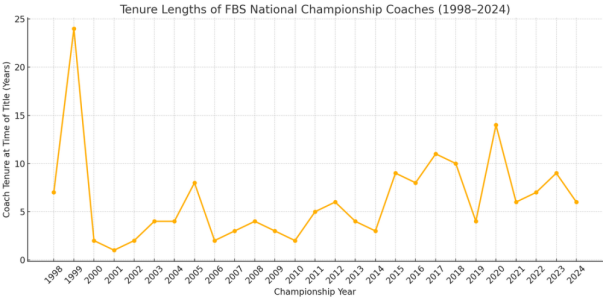FBS National Championship Coaches' Tenure (1998–Present)
From 1998 (start of BCS) through 2024, the average tenure of head coaches at the time they won a national championship is about 6.2 years.
List of champions and tenure at time of title:
1998 — Tennessee — Phillip Fulmer (7th year)
1999 — Florida State — Bobby Bowden (24th year)
2000 — Oklahoma — Bob Stoops (2nd year)
2001 — Miami (FL) — Larry Coker (1st year)
2002 — Ohio State — Jim Tressel (2nd year)
2003 — LSU — Nick Saban (4th year)
2004 — USC — Pete Carroll (4th year)
2005 — Texas — Mack Brown (8th year)
2006 — Florida — Urban Meyer (2nd year)
2007 — LSU — Les Miles (3rd year)
2008 — Florida — Urban Meyer (4th year)
2009 — Alabama — Nick Saban (3rd year)
2010 — Auburn — Gene Chizik (2nd year)
2011 — Alabama — Nick Saban (5th year)
2012 — Alabama — Nick Saban (6th year)
2013 — Florida State — Jimbo Fisher (4th year)
2014 — Ohio State — Urban Meyer (3rd year)
2015 — Alabama — Nick Saban (9th year)
2016 — Clemson — Dabo Swinney (8th year)
2017 — Alabama — Nick Saban (11th year)
2018 — Clemson — Dabo Swinney (10th year)
2019 — LSU — Ed Orgeron (4th year)
2020 — Alabama — Nick Saban (14th year)
2021 — Georgia — Kirby Smart (6th year)
2022 — Georgia — Kirby Smart (7th year)
2023 — Michigan — Jim Harbaugh (9th year)
2024 — Ohio State — Ryan Day (6th year)
Summary and context:
About half of these coaches won the title within their first 4 years at the school — for example, Coker, Stoops, Tressel, Meyer, and Chizik. This suggests that a new coach can often make a big impact quickly, especially if they inherit a strong roster and recruiting foundation.
On the other hand, some coaches took longer to reach the top: Bobby Bowden needed 24 years at FSU before winning it all in 1999, while Harbaugh finally got his breakthrough in year 9 at Michigan, and Dabo Swinney didn’t win his first until his 8th season.
Nick Saban is a unique case, winning titles at Alabama from his 3rd year all the way into his 14th, showing both quick turnaround and sustained dominance.
The average (6.2 years) reflects a balance between “instant impact” hires and long-term program builders. It also suggests that while some programs aim for a quick championship window, others steadily build up to it over a decade or more.



